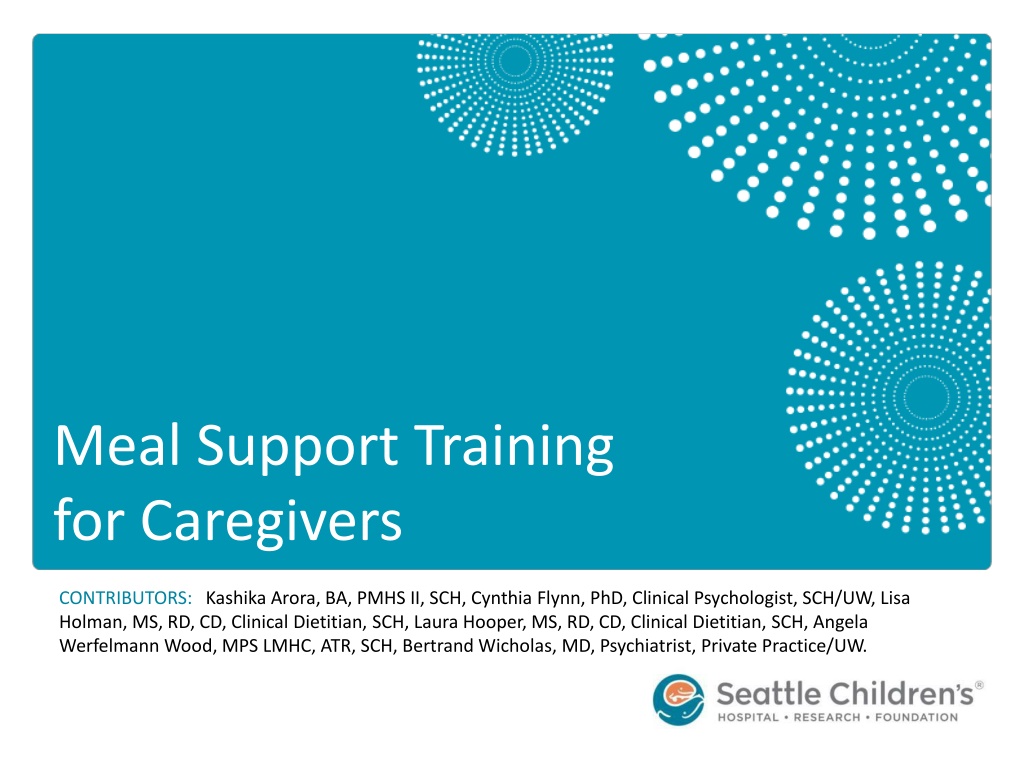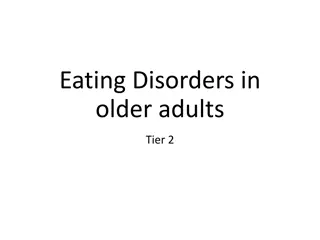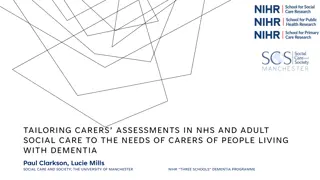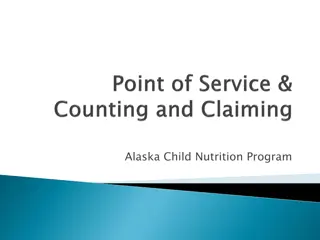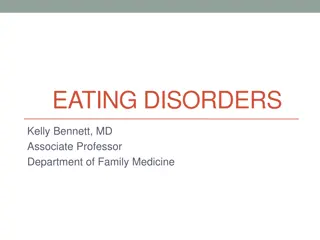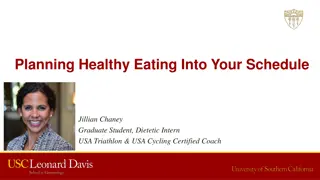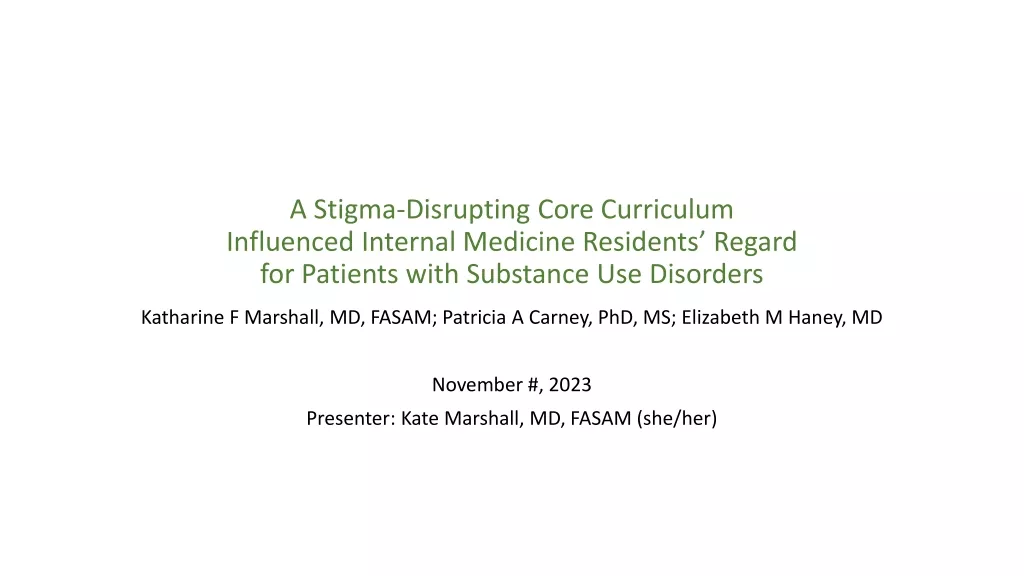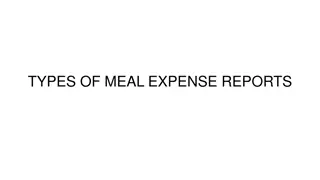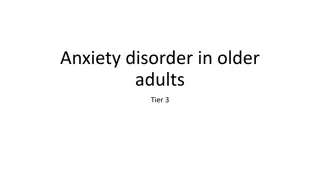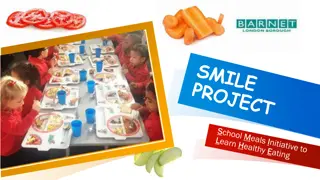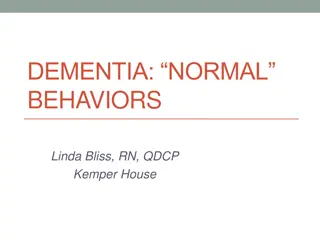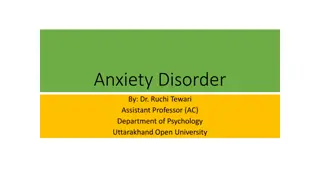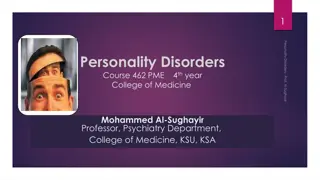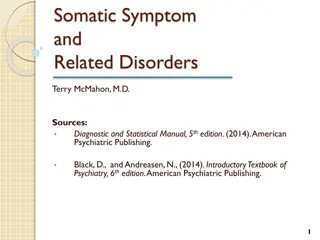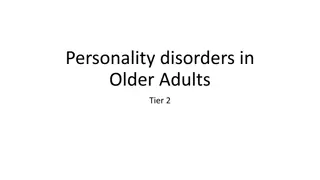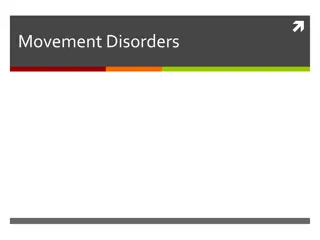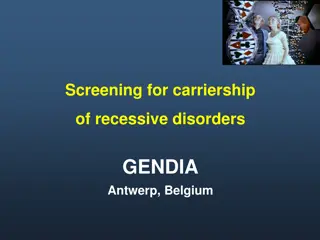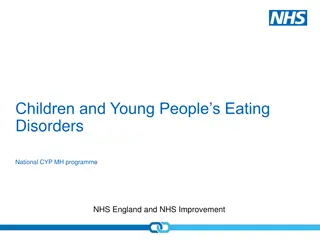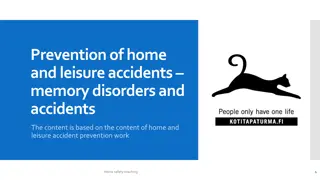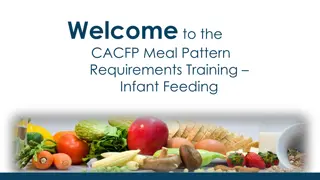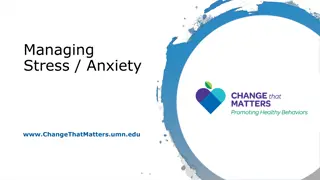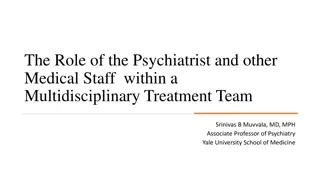Essential Meal Support Training for Caregivers of Individuals with Eating Disorders
Comprehensive meal support training program for caregivers of individuals with eating disorders. Contributors include professionals in psychology, dietetics, and psychiatry. Covered topics include treatment basics, family-based approaches, caregiver expectations, and modeling healthy eating behaviors. Emphasis is on the crucial role caregivers play in supporting recovery and normalizing eating habits.
Download Presentation

Please find below an Image/Link to download the presentation.
The content on the website is provided AS IS for your information and personal use only. It may not be sold, licensed, or shared on other websites without obtaining consent from the author. Download presentation by click this link. If you encounter any issues during the download, it is possible that the publisher has removed the file from their server.
E N D
Presentation Transcript
Meal Support Training for Caregivers CONTRIBUTORS: Kashika Arora, BA, PMHS II, SCH, Cynthia Flynn, PhD, Clinical Psychologist, SCH/UW, Lisa Holman, MS, RD, CD, Clinical Dietitian, SCH, Laura Hooper, MS, RD, CD, Clinical Dietitian, SCH, Angela Werfelmann Wood, MPS LMHC, ATR, SCH, Bertrand Wicholas, MD, Psychiatrist, Private Practice/UW.
Welcome Please introduce yourself: Your name. How old is your child? Is your child at home? In the hospital? On the medical floor or the PBMU? What brings you to this group, and what are you hoping to get out of it?
What Well Review Today Eating Disorder Treatment Basics Providing Meal Support Preparing for meal time During the meal time After meals Debriefing Review and Reminders
Eating Disorder Treatment Basics
Eating Disorders Biologically-based mental health disorders with serious medical consequences Have no clear cause but are likely due to a complex interaction of multiple factors Are not caused by families, but caregivers are crucial to recovery
Family-Based Treatment Approach to Recovery Recovery begins with normalizing eating Food and rest are the medicine Child is expected to complete 100% of their meals Caregivers take control of refeeding Caregivers need to be united on treatment and expectations Important to separate your child from the eating disorder
Caregiver Expectations Caregivers must present a united front against the eating disorder Caregivers need to agree on meal choices and portions before each meal and snack Agree on meal expectations, time cues, and coaching Disagreements between caregivers should be resolved away from youth
Model Healthy Eating and Attitudes Do s Don ts Express appreciation of qualities aside from looks and appearance Don t talk about dieting Don t talk about or comment on your own or other s body weight or appearance Show flexibility around own food choices Remove bathroom scales Don t label foods as good or bad Be selective about your magazines and television shows Don t purchase diet or lite foods
Staying Positive Recovery takes time: Try not to let the eating disorder control your family s life Try to keep a positive home environment despite unsuccessful meals Schedule regular non-eating disorder time with each of your children Be mindful of your own stressors Model your own coping and self-care Remember, recovery is a marathon not a sprint
Preparing for the Meal Time
Being Proactive and Setting Expectations Remember, at this stage in recovery, food is your child s medicine. Expect challenges; you can t get rid of all problems but being proactive and prepared can help to reduce them. Planning meals several days in advance can be helpful.
Meal Time Preparation and Supervision Parents should be in charge of all aspects of meal preparation, including: Grocery shopping Cooking and preparing the meal Serving the meal to ensure accurate portions are served A parent should be present at all meals and snacks to supervise and support their child. At first, your child s only job is to show up at the table and eat the meal that has already been prepared, portioned, and served by parents.
Meal Completion Expectations Set clear expectations: Child in recovery should complete 100% of their meal 3 meals and 3 snacks per day Meals and snacks are at a set time every day Meals and snacks have time limits: 15 minutes for snacks (may range from 15-20 minutes at home) 30 minutes for meals (may range from 30-45 minutes at home) Parents and siblings should eat what is needed for their body s health This may be different from a child who is refeeding
Introducing the Meal Support Plan to Your Child It is important to discuss meal support rules and expectations before starting meal support. Be sure to include these expectations in your discussion: Start by reminding your child that their priority should be recovery and re-nourishing their body Parents will prepare, portion, and serve meals and snacks Your child is expected to complete 100% of their meals Reiterate the time limits for meals Review the plan for addressing dysfunctional eating behaviors at the table Discuss and decide on the distraction techniques your child can use during meal times: music, playing a game, doing a puzzle
Preparing for Meal Time Distress Before, during, and after meals can cause anxiety and distress for your child. Take proactive steps before the meal to help reduce distress before meal time. Coach throughout the meal to help manage distress during the meal. Provide distractions after meal time to help reduce distress after the meal.
Structuring the Meal Time It is important to set up a supportive environment for meal times. Focus on being together and present at the meal. Direct conversations towards light or pleasant topics; avoid high stress topics and discussions about food. Keep energy in the room as calm and peaceful as possible for the meal, with few distractions Clear clutter, set the table, limit phone calls, etc. If needed, review the Meal Support Plan
Be Mindful of the Escalation Cycle The Escalation Cycle is a general model that we use to discuss what happens when individuals experience strong emotions or become distressed. Today we are going to use it as a way to talk about managing distress around meal times.
Baseline: Be Proactive Baseline is the time to have hard conversations, set new expectations, or discuss a change in rules. It is best to set expectations about meal support while everyone is at baseline.
Practice Scenario Parents are preparing dinner. While mom is making the garlic bread, the daughter protests that her mom has put too much butter on the bread and refuses to eat it. Instead, she insists on making her own garlic bread with olive oil. How would you handle the situation?
Preparing for Meal Time Distress Before, during, and after meals can cause anxiety and distress for your child. Take proactive steps before the meal to help reduce distress before meal time. Coach throughout the meal to help manage distress during the meal. Provide distractions after meal time to help reduce distress after the meal.
Escalation Cycle A child struggling with an eating disorder may be triggered and escalate before, during, or after a meal. At meal time, your child may be in escalation, crisis, or de-escalation. There are interventions caregivers can take to help their child through the Escalation Cycle safely.
Escalation: Caregiver Interventions Structure the meal time conversation; be prepared with non-food related topics Coach throughout the meal Address dysfunctional eating behaviors
Guidelines for Meal Conversation Don t talk about food Do come prepared with non-food related conversation topics Don t comment on how much your child is eating Do bring questions/conversation starters if needed Don t enter into negotiations about food Do validate and acknowledge, then redirect the conversation Don t stare at your child or their every bite Do stay aware in order to observe eating behaviors Don t have siblings provide any coaching Do feel free to have siblings involved in conversation
The Importance of Coaching Use coaching to address eating-disordered behaviors and encourage meal completion Keep all coaching short and to the point: I know you can do this. It s ok to eat. You are doing a good job so far, let s keep going. I see you are taking small bites, please take larger bites. It s important to give your body the fuel it needs. We are half way through the meal and you have eaten less than half your meal, try taking larger bites so you can complete everything. Then keep going with conversation unrelated to the meal
Dysfunctional Eating Behaviors Your child may exhibit some eating behaviors that are not functional or healthy during the meal time. Some examples are: Taking small bites Dropping food Smearing food on napkins or table Cutting food up in small pieces
Dysfunctional Eating Behaviors Address dysfunctional behaviors as they occur. Focus on positive, action-oriented statements: Please take bigger bites Please, pick that up from your lap Please, roll up your sleeves so food doesn t get on your shirt Stop crumbling your bread Replace food that was dropped on floor or hidden** I m giving you another piece of chicken to make up for the pieces that fell on the ground **This will look different depending on if your child is at home or in the hospital. Please discuss any questions/concerns with your providers.
Practice Scenario Parents notice several dysfunctional eating behaviors at the dinner table. Daughter is cutting the food up into tiny pieces and taking tiny bites. Daughter seems to be crumbling her bagel and small pieces are falling on her lap. How would you address these behaviors during the meal?
Non-Completion of Meals What to do if your child doesn t complete a meal or snack: Ask your child/teen to take 1 more bite Follow the plan discussed with your providers for coaching and meal replacement If your child is on the medical floor or PBMU, they will get a supplemental meal replacement. If your child is at home, it is best to use coaching, support, and firm, consistent expectations to get to 100% completion. Supplemental meal replacement at home should only occur when advised by your treatment team.
Non-Completion of Meals If your child does not complete their meal, focus on the natural consequences of their behavior. Completing meals can lead to more privileges and independence (as age-appropriate). Restrictions can be placed on physical activity until the next meal is completed (purpose is to conserve energy). Energy out must match energy in. Remind your child/teen: You must fuel your body to have the life and freedom you want.
After Meals Post-meal may include physical and emotional distress for your child/teen: o Feeling full and uncomfortable o Feelings of guilt or shame for eating too much Your child may be in crisis, de-escalation, or post-crisis recovery
After Meals De-escalation after meals depends on the amount of distress your child experienced during the meal. The time it takes for a child/teen to return to baseline varies greatly. Wait at least an hour and ensure the child has returned to baseline before problem solving or debriefing.
Preparing for Meal Time Distress Before, during, and after meals can cause anxiety and distress for your child. Take proactive steps before the meal to help reduce distress before meal time. Coach throughout the meal to help manage distress during the meal. Provide distractions after meal time to help reduce distress after the meal.
Support After Meals The goal during this time is to help your child/teen learn to cope with uncomfortable emotions and physical sensations, and also to prevent compensatory behaviors such as purging, over-exercising, body checking, and self-harm. To help support them during this time set the following expectations: No exercising or standing during this time Encourage low energy activities Discuss a bathroom lockout plan with your providers
Guidelines for After Meals Discouraged Suggested Don t talk about the meal Watch a movie together Avoid high-stress conversation topics Do a puzzle or play a game together Don t debrief or problem solve Encourage child/teen to read a book Avoid exercise related coping skills or high-energy activities Do an artistic or self-expressive activity Don t negotiate about consequences Follow predetermined consequences
Practice Scenario After meal support, the child reminds parents that he has plans to go to his friend s house to watch a movie and eat evening snack. However, he was not able to complete 100% of his dinner. Mom believes it s important for the child to stay connected with his friends and thinks he should go. Dad feels it sends the wrong message to allow the child to go out when he cannot complete the meals. How should parents handle this situation?
Debriefing Set Up Debriefing should take place once everyone is at their baseline this might be an hour or more after meal. Limit debrief to half an hour maximum.
Value of Debriefing Debriefing the meal is important so that the meal is a learning experience. Not all meals require debriefing Debrief after hard meals Debrief after the first meal that goes well in a series of hard meals (want to know what went well) This is when we all are able to learn new coping skills, problem solve and talk about natural consequences. If your child/teen starts to escalate during the conversation, pause debrief and encourage them to use coping skills. Return to debrief after returning to baseline.
How to Debrief the Meal Discuss: What worked well? What didn t work? Identify possible triggers for distress Develop plan for addressing problem behaviors at next meal Discuss natural consequences, if needed
